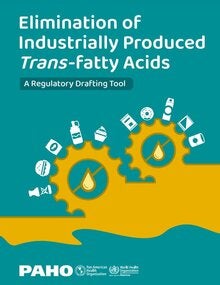
Washington, DC, 8 August 2023 - The Pan American Health Organization (PAHO) brought together a group of Member States experts to review existing regulatory proposals from different countries in the Region that aim to eliminate industrially-produced trans-fatty acids (IP-TFA) from the food supply. Trans fat clogs arteries and increases the risk of coronary heart disease.
The workshops were held at The Pan American Health Organization headquarters on the 7 and 8th of August 2023, with the participation of representatives of ministries of health and legislators from Panama, Mexico, Ecuador, and Costa Rica along with experts from Resolve to Save Lives, and the World Health Organization.
The primary objective of the meetings was to assist in the development and refinement of regulatory instruments specific to each country, as well as to discuss a roadmap to approve and enact these regulatory mechanisms.
This joint action group analyzed the IP-TFA elimination around the world, the role of the mandatory regulations to achieve it, and the Latin American regulatory landscape with each current policy status per country. Discussions between countries were held with a guided session to evaluate each country´s regulatory instrument as well as discussing considerations for inspection and enforcement – including the introduction of nutrition labeling.
Collaboration between countries during the meeting involved group-work discussions about strategies for monitoring the food supply chain, including an introduction to licensing, registration, permit schemes, and budgeting for their implementation. Finally, lessons learned, and country experiences were key components to establishing inter-country fruitful relationships.
What are Trans-fatty acids?
Trans fatty acids are unsaturated fatty acids that come from either natural (ruminant) or industrial sources. Relevant industrial processes add hydrogen to vegetable oils to convert the liquid oil into solids known as “partially hydrogenated” oils. These partially hydrogenated oils prolong the shelf life of manufactured food products and are usually used for deep frying and as an ingredient in baked goods. High intake of trans fatty acids is due mainly to the consumption of IP-TFA.
Situation
Globally, approximately 540,000 deaths each year are attributable to the consumption of industrially produced trans-fatty acids (IP-TFA), 160,000 occurring in the Region of the Americas. High trans-fat intake increases the risk of death from any cause by 34%, death from coronary heart disease by 28%, and coronary heart disease by 21%.
In 2007, PAHO convened the Trans-FatFree America Task Force, an initiative that issued the Declaration of Rio de Janeiro in 2008, with voluntary commitments to remove IP-TFA from the food supply. While significant progress has been made, this goal has not been achieved, and trans-fatty acids continue to be used in several Member States. An important lesson learned was that voluntary measures were not sufficient. Therefore, PAHO launched the 2020-2025 regional plan to eliminate IP-TFA. The plan offers a straightforward path to action and technical support to the Member States.
In 2018, WHO launched the REPLACE action package to support governments in implementing the elimination of IP-TFA from the food supply. WHO has set a target of eliminating worldwide IP-TFA by 2023. In this regard, PAHO is collaborating with Resolve to Save Lives, a non-profit organization committed to saving lives from these preventable causes by partnering with government and civil society to implement scalable, proven strategies, to catalyze the adoption of best practices for IP-TFA elimination.
In 2020, PAHO launched a 5-year regional plan to eliminate IP-TFA with a straightforward path to action and technical support to the Member States. To date, in the Region, the countries that either have banned partially hydrogenated oils from the food chain or who have passed a limit of 2% on TFA content in foods are Canada, the United States of America, Mexico, Colombia, Bolivia, Chile, Argentina, Paraguay, and Brazil. In total 828 million people are covered by TFA elimination practices.
Download the publication Elimination of Industrially Produced Trans-fatty Acids: A Regulatory Drafting Tool, here.





